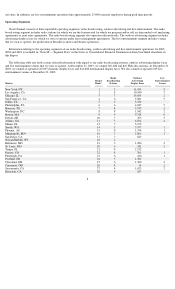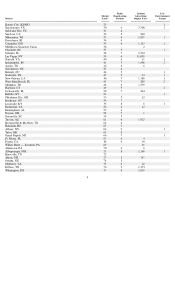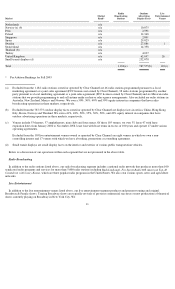iHeartMedia 2003 Annual Report Download - page 17
Download and view the complete annual report
Please find page 17 of the 2003 iHeartMedia annual report below. You can navigate through the pages in the report by either clicking on the pages listed below, or by using the keyword search tool below to find specific information within the annual report.
relaxation of the FCC’s ownership rules has increased the level of competition in many markets in which our stations are located.
Alien Ownership Restrictions
The Communications Act restricts the ability of foreign entities or individuals to own or hold certain interests in broadcast licenses. Foreign
governments, representatives of foreign governments, non-U.S. citizens, representatives of non-U.S. citizens, and corporations or partnerships
organized under the laws of a foreign nation are barred from holding broadcast licenses. Non-U.S. citizens, collectively, may own or vote up to
twenty percent of the capital stock of a corporate licensee. A broadcast license may not be granted to or held by any entity that is controlled,
directly or indirectly, by a corporation more than one-fourth of whose capital stock is owned or voted by non-U.S. citizens or their
representatives, by foreign governments or their representatives or by non-U.S. corporations, if the FCC finds that the public interest will be
served by the refusal or revocation of such license. The FCC has interpreted this provision of the Communications Act to require an affirmative
public interest finding before a broadcast license may be granted to or held by any such corporation, and the FCC has made such an affirmative
finding only in limited circumstances. Since we serve as a holding company for subsidiaries that serve as licensees for our stations, we are
effectively restricted from having more than one-fourth of our stock owned or voted directly or indirectly by non-U.S. citizens or their
representatives, foreign governments, representatives of non-foreign governments or foreign corporations.
Other Regulations Affecting Broadcast Stations
General. The FCC has significantly reduced its past regulation of broadcast stations, including elimination of formal ascertainment
requirements and guidelines concerning amounts of certain types of programming and commercial matter that may be broadcast. There are,
however, statutes and rules and policies of the FCC and other federal agencies that regulate matters such as network-affiliate relations, the
ability of stations to obtain exclusive rights to air syndicated programming, cable and satellite systems’ carriage of syndicated and network
programming on distant stations, political advertising practices, obscenity and indecency in broadcast programming, application procedures
and other areas affecting the business or operations of broadcast stations.
Public Interest Programming. Broadcasters are required to air programming addressing the needs and interests of their communities of
license, and to place “issues/programs lists” in their public inspection files to provide their communities with information on the level of
“public interest” programming they air. In October 2000, the FCC commenced a proceeding seeking comment on whether it should adopt a
standardized form for reporting information on a station’s public interest programming and whether it should require television broadcasters to
post the new form — as well as all other documents in their public inspection files — either on station websites or the websites of state
broadcasters’ associations. Moreover, in August 2003 the FCC introduced a “Localism in Broadcasting” initiative that, among other things, has
resulted in localism hearings at various locations throughout the country and contemplates a future proceeding on FCC rules and procedures
aimed at promoting localism.
Equal Employment Opportunity. The FCC’s equal employment opportunity rules generally require broadcasters to engage in broad and
inclusive recruitment efforts to fill job vacancies, keep a considerable amount of recruitment data and report much of this data to the FCC and
the public via stations’ public files and websites. The FCC is still considering whether to apply these rules to part-time employment positions.
Broadcasters are also obligated not to engage in employment discrimination based on race, color, religion, national origin or sex.
Digital Audio Radio Service. The FCC has adopted spectrum allocation and service rules for satellite digital audio radio service. Satellite
digital audio radio service systems can provide regional or nationwide distribution of radio programming with fidelity comparable to compact
discs. Two companies-Sirius Satellite Radio Inc. and XM Radio-have launched satellite digital audio radio service systems and are currently
providing nationwide service. The FCC is currently considering what rules to impose on both licensees’ operation of terrestrial repeaters that
support their satellite services. The FCC also has approved a technical standard for the provision of “in band, on channel” terrestrial digital
radio broadcasting by existing radio broadcasters (except for nighttime broadcasting by AM stations, which is undergoing further testing), and
has allowed radio broadcasters to convert to a hybrid mode of digital/analog operation on their existing frequencies. The FCC plans to address
formal standards and related licensing and service rule changes for digital audio broadcasting in a later rulemaking. We cannot predict the
impact of either satellite or terrestrial digital audio radio service on our business.
17
























